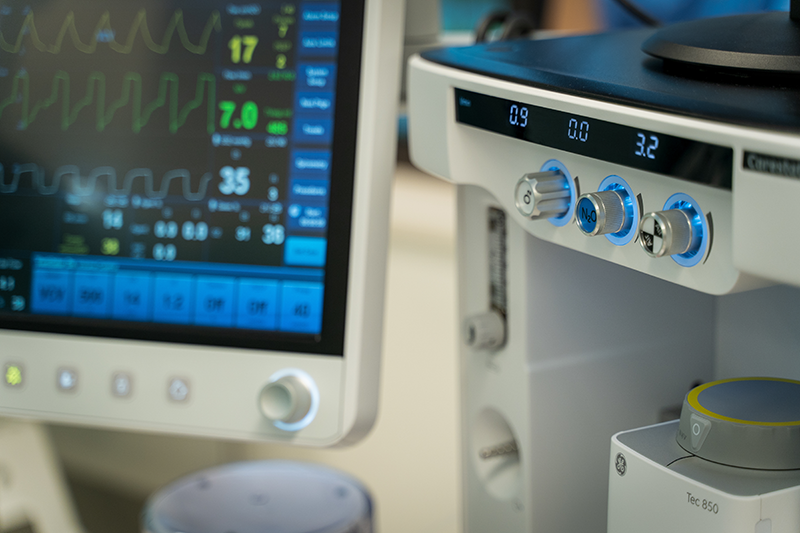UK healthcare leads the phase-out of desflurane - a potent greenhouse gas
NHS Scotland and NHS England are the first health systems in the world to announce a phase-out of desflurane - an anaesthetic gas with a global warming potential 2,500 times greater than carbon dioxide. NHS Scotland announced an immediate ban on desflurane use, while NHS England committed to phasing it out by 2024.
What is global warming potential?
Put simply, the global warming potential (GWP) of a greenhouse gas is a measure of how much heat it absorbs in the atmosphere and therefore contributes to global warming, when compared to the same mass of carbon dioxide - the GWP of CO2 is 1. Other factors, such as timeframe, are also taken into consideration.
In most cases, alternative anaesthetic gases with a significantly lower global warming potential can be used without affecting clinical practice. Health services in Scotland and England are taking the lead with a system-wide approach. Phasing out such a potent greenhouse gas will greatly reduce healthcare emissions and can easily be rolled out across Europe.
Scotland’s NHS announced it would immediately stop the use of desflurane in its operating theatres. Highlighting that this is just the first step of their National Green Theatres Programme, NHS Scotland has also set a target to be net zero for anaesthetic gases by 2027.
“Volatile anaesthetic gases contribute a large part of the carbon footprint from surgical procedures. It is important to stop using desflurane to reduce that burden. The first action of NHS Scotland's National Green Theatres Programme is to stop using desflurane from February 2023 and we welcome NHS England’s announcement to eliminate desflurane by early 2024. Ultimately, we should aspire to embed environmental sustainability into all our clinical and management decisions." - Kenneth Barker, Clinical Lead - National Green Theatres Programme (NHS Highland)
With support from the Royal College of Anaesthetists and the Association of Anaesthetists, NHS England made a similar announcement stating that it will stop using desflurane, except in exceptional circumstances, across its operations by early 2024. By phasing out this harmful anaesthetic gas, they expect to reduce emissions by around 40 kilotonnes of carbon a year - the equivalent of powering 11,000 homes every year.
“Thanks to the efforts of NHS staff up and down the country, along with the support of the Royal College of Anaesthetists and the Association of Anaesthetists, we can and will put anaesthetic emissions to bed. For the benefit of patients and the planet,” wrote Nick Watts, Chief Sustainability Officer - NHS.
How do anaesthetic gases contribute to global warming?
 Anaesthetic gases used in operating theatres are potent greenhouse gases. Commonly used anaesthetics include nitrous oxide and the fluorinated gases sevoflurane, iso
Anaesthetic gases used in operating theatres are potent greenhouse gases. Commonly used anaesthetics include nitrous oxide and the fluorinated gases sevoflurane, isoflurane, and desflurane - these gases enter the atmosphere and significantly contribute to climate change.
Nearly four million tonnes of healthcare emissions globally come from the sector’s use of anaesthetic gases and metered dose inhalers. Addressing these emissions is a crucial step to protecting public health from the impacts of climate change.
Anaesthetic capture systems can help to reduce the emissions, but phasing out the most emissions-intensive anaesthetic gases supports a greater reduction at the source. Alternatives such as sevoflurane have a global warming potential of 130 kgCO2e/kg - nearly 20 times less than desflurane, 2,540 kgCO2e/kg.
Phasing out desflurane to achieve net zero healthcare
Individual healthcare facilities ac ross Europe are taking crucial steps to mitigate emissions from anaesthetics. Many healthcare providers across the UK have already stopped using desflurane, and the rest of NHS England and NHS Scotland will follow after making crucial system-level commitments to zero emissions healthcare.
ross Europe are taking crucial steps to mitigate emissions from anaesthetics. Many healthcare providers across the UK have already stopped using desflurane, and the rest of NHS England and NHS Scotland will follow after making crucial system-level commitments to zero emissions healthcare.
The Amsterdam University Medical Centre has phased out several anaesthetic gases, including nitrous oxide, desflurane, and isoflurane. At the same time, the centre has also reduced its use of sevoflurane by 70% - significantly reducing related emissions.
“Decommissioning desflurane is a step in the right direction for the NHS as desflurane is the most harmful anaesthetic currently in use. Inhalational anaesthetics are all potent greenhouse gases, and limiting their use is one of the most effective measures a healthcare system can implement on the road to achieving carbon neutrality. I hope that other countries will follow this example.” - Dr. Niek Sperna Weiland, Anaestheosiologist - Amsterdam University Medical Centre
The actions of these leading individual hospitals are commendable - but system-level action is required to ensure large-scale change to combat the climate crisis. The European Commission has proposed a ban on fluorinated greenhouse gases, including desflurane, under the European Green Deal. If successful, it will come into effect on 1 January 2026 and prohibit the use of desflurane as an inhalation anaesthetic across EU member states unless strictly required on medical grounds.
“The climate crisis is already affecting the health and lives of people across Europe. Following the example set by NHS Scotland and NHS England, we call on all European health systems to take meaningful action in phasing out environmentally harmful anaesthetic gases, including desflurane, to protect public health now and for future generations.” - Will Clark, Executive Director - HCWH Europe
